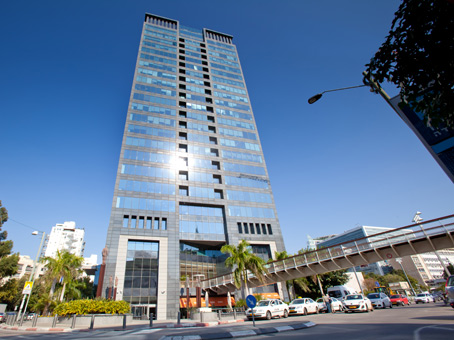
[Updated Oct 2020] A guide to serviced offices and office space to rent in Tel Aviv as well as general information that may be useful if you are considering renting office space in the city.
For further Tel Aviv offices information or to search office space to rent in Tel Aviv just click. Or contact us for any office space search query.
History & Geography
Located on the coastline of the Mediterranean, Tel Aviv is Israel’s second most populous city and one of the most important cities in the region. Tel Aviv lies a little north of the port of Jaffa and south of Haifa near the mouth of the Yarkon River. The city was founded in 1909 by the Jewish Community of Jaffa and soon grew to be larger than the ancient port town. The two have since been made into a single municipality. Jaffa itself is one of the oldest cities in the region, first being mentioned as far back as 1470 BC. The port has been occupied by the Crusaders, the Ottoman Empire and even Napolean for a brief period. But after Tel Aviv was founded on the desert outskirts of Jaffa, it grew to be the larger of the two towns. Much of this growth was due to the Jaffa Riots in the 1920s, caused by unrest between Jaffa’s Arab and Jewish populations. After these incidents, most of Jaffa’s Jewish population moved to Tel Aviv. During the British Mandate in the early 20th century, Tel Aviv grew on the back of new businesses being opened in the city. During WWII the city grew further as thousands of Jews fled Europe to seek refuge in the city. After Israeli independence in 1948, the city continued to grow and many country’s decided to locate their embassies there. The incorporation of Jaffa in 1950 added to the size and population of Tel Aviv. Since then Tel Aviv has officially become a world city and is home to sizable technology and financial service industries.
Economy
Due to the fact that the city was built on sand dunes, there is little farming around Tel Aviv. Instead, the city has become a centre of business and scientific research. Newsweek once described Tel Aviv as one of the top ten most technologically influential cities in the world. Downtown Tel Aviv has so many technology companies that it is sometimes referred to as Silicon Wadi. Additionally many international venture capital firms have chosen to base themselves in the city. Chemical processing, textile plants and food manufacturing are also important parts of the city’s economy. Forbes magazine recently reported that nine of the 15 Israeli billionaires live in Israel of which four live in Tel Aviv. Cost of living in Israel is generally considered to be high and Tel Aviv is the most expensive city in the country. Human resources consulting firm Mercer has said that Tel Aviv is the most expensive city in the Middle East and the 19th most expensive in the world.
Tourism
The tourism industry is also very important to Tel Aviv, and with almost three million tourists every year, it is a popular destination. Known as ‘the city that never sleeps’ Tel Aviv is famous for its nightlife and young 24-hour culture. The beaches of Tel Aviv are generally considered to be some of the best in the world and are the centres of the city’s outdoor culture. Additionally, the city is known for its unique modern architecture. Tel Aviv’s White City is an area known for its Bauhaus buildings and has been dubbed a World Heritage Site by UNESCO. Architectural tours of the area are popular and can be done on bikes, Segways, or on foot. Tel Aviv also boasts a number of renowned museums, the most famous being the Eretz Israel Museum, known for its archaeology and history exhibits. The Batey Haosef Museum is also popular with visitors and covers the history of the Israel Defense Forces.
Transport
Tel Aviv is a major transportation hub for the region and also boasts an excellent transport infrastructure within the city. The Tel Aviv Central Station is the largest train station in the city and over one million travellers come to Tel Aviv by train every month. A new light rail system is due to open in 2016. In the city bus transport is the most popular way to get around, as well as taxis. However, bicycles are also popular and in 2011 a bike-sharing system was introduced. Ben Gurion International Airport, located in the neighbouring city of Lod, serves Tel Aviv. It is Israel’s main international airports and handles over 12 million passengers a year.

Renting Office Space in Tel Aviv
According to CBRE, the average office space rent in downtown Tel Aviv is USD 28 per square metre per month, and currently, there is about 20,000 square metres of unoccupied office space in the city a recent CBRE report shows. Despite this, licenses are being issued for the construction of new office space in the city, which will add hundreds of thousands of square metres of space. The Sarona district, in particular, is being developed as an office area and Tel Aviv has recently seen the addition of a few major office developments, including the First International Bank Tower and 1 Rothschild Tower. The city’s office market is recovering from the economic crisis which badly affected the city. A recent MAN Properties report stated: “As Israel’s leading city, both in terms of real estate values and in market size, Tel Aviv benefits from the strongest growth rates when the market rises, just as it is the main victim when the market falls. In areas such as Tel Aviv, which prior to the crisis saw heavy demand and had impressive occupancy rates of over 95 percent, saw thousands of square meters of office space become available for leasing and sub-leasing, and rent fell by an average of 20 percent.”
Our office space search, advisory and acquisition services are FREE, always. We are globally regulated by the Royal Institution of Chartered Surveyors (RICS) ensuring the highest standards of commercial property advice and service at all times.
